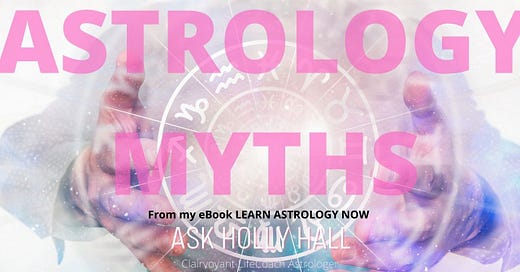Most people only know about astrology from the horoscope columns they read in newspapers and magazines. But, those forecasts are for entertainment purposes only and should never be taken seriously. If they seem even remotely accurate, rest assured it is only by coincidence, because those columns have almost no bearing on the legitimate practice of astrology. Here are a few other myths about astrology that should also be dispelled:
1. Astrology is not a religion, nor is it affiliated or associated with any religion or with satanism or any specific belief system. You can believe in and participate in any religion you choose and still practice astrology.
2. Astrology is about symbolism and has nothing to do with any purported physical energy emanating from a planet, moon, or star.
3. Astrology cannot be used to predict an event, only the possibility of an event occurring, or a good time for a particular type of event to take place.
4. Astrology is only a guide, a map of the potential in your life. However, no two people born at the exact same time and place will have the exact same life. The very nature of astrology speaks to your exercise of "free will" and the many choices and options you have for how you live your life.
DID YOU KNOW?
Throughout most of its history, astrology was considered a scholarly tradition and was common in academic circles, often in close relation with astronomy, alchemy, meteorology, and medicine. It was present in political circles and is mentioned in various works of literature, from Dante Alighieri and Geoffrey Chaucer to William Shakespeare, Lope de Vega, and Calderón de la Barca. Astrology lost its academic and theoretical standing, and common belief in it has largely declined, until a resurgence starting in the 1960s.
Astrology, in its broadest sense, is the search for meaning in the sky. Early evidence for humans making conscious attempts to measure, record, and predict seasonal changes by reference to astronomical cycles, appears as markings on bones and cave walls, which show that lunar cycles were being noted as early as 25,000 years ago. This was a first step towards recording the Moon's influence upon tides and rivers, and towards organizing a communal calendar. Farmers addressed agricultural needs with increasing knowledge of the constellations that appear in the different seasons—and used the rising of particular star groups to herald annual floods or seasonal activities. By the 3rd millennium BCE, civilizations had sophisticated awareness of celestial cycles and may have oriented temples in alignment with heliacal risings of the stars.
Western
Western astrology is a form of divination based on the construction of a horoscope for an exact moment, such as a person's birth. It uses the tropical zodiac, which is aligned to the equinoctial points.
Western astrology is founded on the movements and relative positions of celestial bodies such as the Sun, Moon and planets, which are analyzed by their movement through signs of the zodiac (twelve spatial divisions of the ecliptic) and by their aspects (based on geometric angles) relative to one another. They are also considered by their placement in houses (twelve spatial divisions of the sky). Astrology's modern representation in western popular media is usually reduced to sun sign astrology, which considers only the zodiac sign of the Sun at an individual's date of birth, and represents only 1/12 of the total chart. However, my work does go much deeper.





